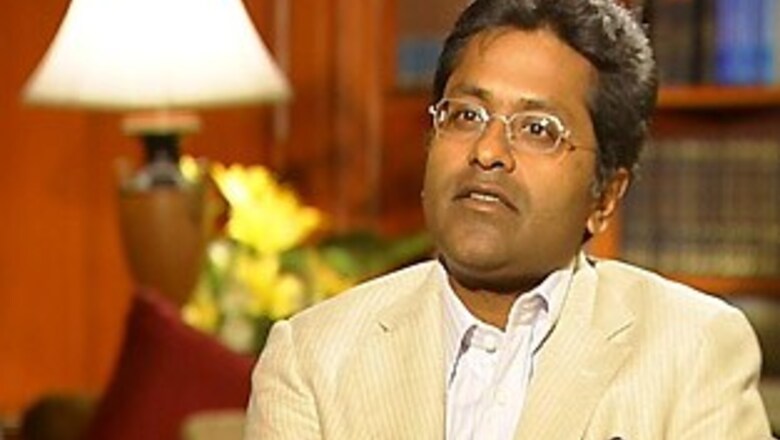
views
March 21, 2009: A phone rings at 5 am in a London house. A just out of bed Andrew Wildblood answers it. The voice on the other end is from 5,000 miles away in Mumbai. It belongs to Indian Premier League (IPL) Commissioner Lalit Modi. “I have your IMG team [event managers] sitting with me in my office. Is it possible to shift the IPL to South Africa with three weeks notice?” Wildblood replies, “If the team thought it was possible then it was possible.” Modi says, “Let’s go for it, meet us in Johannesburg on Monday”
That’s Lalit Modi: Workaholic, go-getter, restless, works best in chaos. Not many people would have taken on the country’s Home Minister at a time when he needed him most; fewer would have taken a $2 billion sporting tournament outside the country in only its second year. Yet Modi did both when the Indian government refused to provide security for the IPL matches as the dates clashed with the general elections — and thrived.
The first thing you notice about Modi is that he is always moving, even when he is sitting in a chair at press conferences. His eyes scan the room for people he wants to see, when he catches their eye he subtly gestures to them. When he is not sitting, he is networking. Anyone who has watched the IPL on TV has seen him chatting up politician Sharad Pawar, sharing a laugh with blonde spinner Shane Warne or chilling out with the flamboyant Vijay Mallya. And it pays off. When he needs people, he simply picks up a phone and calls them, anytime of the day or night.
That’s how Etienne de Villiers, chairman BBC Worldwide and François Pienaar, South African rugby legend joined the core team at IPL 2009. “Lalit called me up on March 22 and I got on board,” says de Villiers. He has known Modi since 1989 when de Villiers got in touch with him as head of Walt Disney’s international ventures. Villiers is based in London. One day after getting a call from Modi, he was on a plane to South Africa. Two days later he was meeting potential partners in trying to negotiate deals and drum up interests.
We asked Modi what was the most difficult problem that he encountered while organising the tournament, he said “to move Season 2009 of the IPL overseas for the BCCI (Board for Cricket Control in India) was the single biggest decision and challenge. Once we took that the rest was easy!”
Easy might not be the best word to describe it. Both de Villiers and Pienaar moved out of their houses and were living out of hotels for two months with Modi putting the tournament together. Logistics were a nightmare. Internal travel arrangements, rescheduling, ticketing, hotel bookings, team movement, TV production, basically every aspect of event management had to re-thought and re-strategised. “People went nights without sleep driven by professional pride and an overwhelming desire to deliver,” says Wildblood. Villiers says they covered five cities in one day doing radio promotions. What everyone agrees is that the IPL 2009 was one of the most exciting events that they had been part of. Modi is aware of what he has created. He knows he has an incredibly successful product in the IPL.
He is also incredibly competitive. He fast-tracked the first season of the IPL by a whole year. Manoj Badale, owner of Rajasthan Royals recollects a lunch with Modi in October 2007 where Modi told him that he was planning a cricket league in a year’s time. “I had a sort of a 2009 project in my mind, then the ICL (Indian Cricket League) happened and it became a 2007 project.” Modi wants the best and he backs himself to pull it off. He has tremendous self-belief. Bigger is better. Little wonder that the IPL franchisee owners share a similar mindset. Mukesh Ambani — India’s richest individual, Shah Rukh Khan — arguably the top film star in the country, Vijay Mallya who wants to fly higher all the time.
“Lalit has irrepressible energy. He wants to create all the time. He is a restless soul,” says de Villiers. “He debated with me about the choice for the venue. England vs South Africa. I said South Africa, not because of the weather but because of the flexible and can-do attitude here. England is much more formal. Planning, development and availability and accessibility to media takes longer. At the time, it was a huge risky call to move the IPL out of India. It was a pretty high demand to put on 59 matches, you needed a lot of flexibility and that’s what South Africa had,” says de Villiers.
PAGE_BREAK
Once the decision was taken there was no looking back. Any idea however preposterous was welcome. Villiers remembers suggesting they hold a carnival with floats in Cape Town as a pre-cursor to the event. But the city needed to be shut down for the duration. Modi loved it and that was it. No doubts on how this could be pulled off. “Francois said ‘I’ll call the mayor’. She was running against current President Zuma. No one except Mandela could have gotten an appointment with her on such short notice. But we did. The next thing we know we are sitting in her conference room with some of the high Cape Town officials and we are discussing matters. ‘Can we do it?’ ‘Yes of course, when do you want the city closed? It has to be at a time when nothing much is happening.’ ‘How about on a Thursday afternoon?’ ‘That’s perfect.’ We had all caught Lalit’s fast decision bug,” says de Villiers.
At 46 years, Modi wears many hats and juggles them well: IPL Chairman and Commissioner, Vice President of BCCI, Vice President of Punjab Cricket Association, Executive Director of Godfrey Philips India and Director of Various Modi Group Companies. He has to work hard for success; controversy on the other hand comes easily to him. An issue which surfaces every couple of years is his conviction for possessing 400 grams of cocaine when he was a student at Duke University, USA in 1985. In early December his supporters were manhandled by Congress Party workers at the Rajasthan Cricket Association elections. There is a case against him for fraud in the RCA.
Modi is also an intensely private individual. His sea-facing bungalow at Juhu in Mumbai is guarded by 25 security men. You are searched before you enter the house. He has a home-staff of 10 people consisting of butlers, cleaners, cooks and drivers. They are very guarded and very protective of him. He loves collecting statues from South-East Asia and China. The interiors are done up very well. He has good style. Contemporary art adorn his walls.
A couple of unopened portraits lie in the library waiting for him to open them. He is always on the move. When we booked time with him for a photo-shoot, he had wrapped up business at the BCCI headquarters in South Mumbai. He had meetings on either side of the shoot. This was on a day when he was scheduled to leave for Paris in a couple of hours. He is full of energy, always on the move.
Of course, he is just as ruthless when it comes to money and protecting the image of his brand. IMG and the IPL were very recently involved in a controversy when IMG was fired as the event managers because of a fee dispute. They were rehired after the eight franchisees made a ruckus. SET Max from Sony Entertainment Television had to pay more to retain rights to telecast the IPL this year. Last year they had paid $1 billion to get the IPL rights for 10 years.
He expects complete loyalty from the people around him. Under him, the pensions of all the ex-cricketers were raised from Rs. 5,000 to Rs. 25,000 a month. But, when bowling legend Kapil Dev and other former cricketers joined the rebel ICL, their pensions were discontinued.
What is undoubted is that when Modi is running the show one can expect that it will be extravagant and well run. Going back to IPL 2009, all the franchisee owners were worried that the tournament would be cancelled and that meant all of their brands would take a huge hit. Modi ensured that the show went on. The IPL also compensated the franchisee owners for any additional expense that they bore on account of the shift in venue. No sport has ever done that.
Before Modi was a part of the BCCI, cricket in India used to earn $67 million a year. Now it earns more than $1 billion annually. His products are premium and so is the price. He has the support of Minister of Agriculture and Nationalist Congress Party chief Sharad Pawar who served a term as BCCI chairman from 2005 to 2008. A lot of the billion dollar deals were struck during his tenure.
If the Indian cricket team discovered aggression under Sourav Ganguly in 2001, Indian cricket management got its aggro under Modi. Gone are the days when the England-Australia combine dictated terms. Indian cricket is brash, unapologetic and ruthless today, just like Modi.












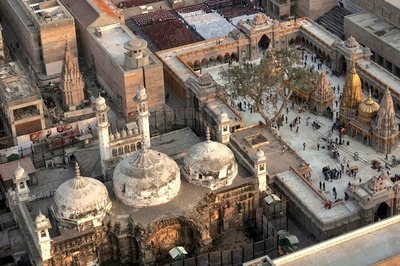


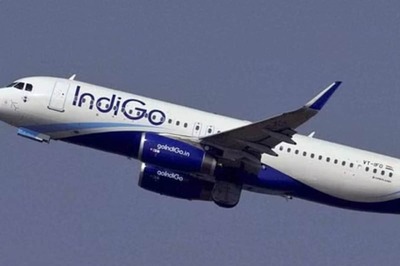
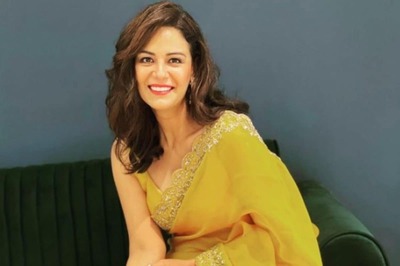


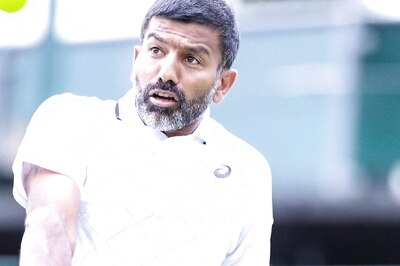
Comments
0 comment